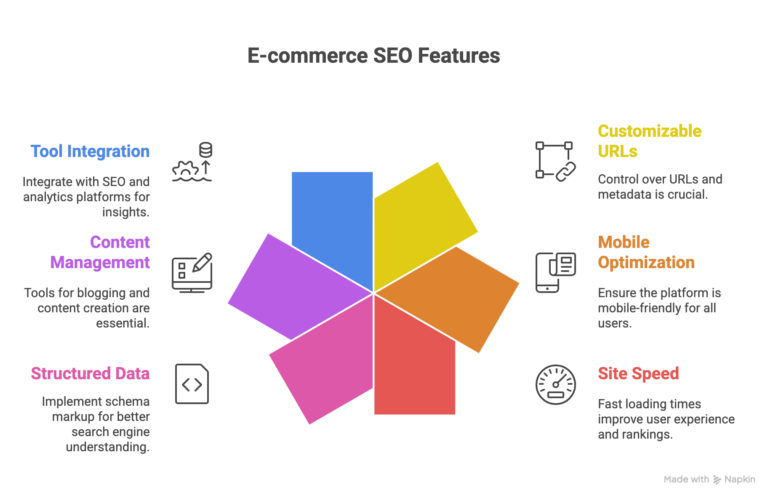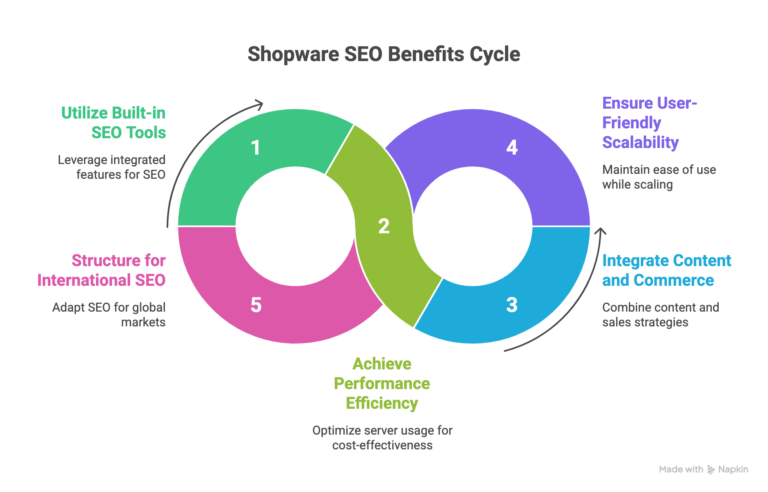Greetings! I'm Aneesh Sreedharan, CEO of 2Hats Logic Solutions. At 2Hats Logic Solutions, we are dedicated to providing technical expertise and resolving your concerns in the world of technology. Our blog page serves as a resource where we share insights and experiences, offering valuable perspectives on your queries.

Quick Summary
This guide compares the SEO capabilities of five major e-commerce platforms: Shopify, WooCommerce, BigCommerce, Magento, and Shopware, helping businesses choose the best platform to enhance their online store’s visibility and organic traffic.
Having a perfect online store isn’t enough if customers can’t find you on Google. While platforms like Shopware and its competitors all promise top-notch SEO features, choosing the right one for your business can be overwhelming.
In this guide, we’ll compare the SEO capabilities of leading e-commerce platforms, helping you make an informed decision that will boost your store’s visibility and drive more organic traffic to your products.
Why SEO Matters for E-commerce Platforms?
SEO helps your store rank higher on search engines like Google. This makes it easier for potential customers to find you. Without proper SEO, even the best products can get lost among countless online stores.
Pro Tip
The platform you choose affects how easily you can optimize your store for search engines. It also impacts how well your store performs in the long run.
Key SEO Features to Look for in an E-commerce Platform
Before diving into platform comparisons, let’s outline the essential SEO features you should look for:

1. Customizable URLs and Metadata: Editing URLs, meta titles, and descriptions is key to targeting keywords and boosting click-through rates.
2. Mobile Optimization: With most shoppers browsing on mobile devices, a responsive design is non-negotiable.
3. Site Speed and Performance: Fast loading times improve user experience and are a ranking factor for search engines.
4. Structured Data and Schema Markup: This helps search engines understand your content and display rich snippets, which can boost visibility.
5. Blogging and Content Management Tools: Built-in tools for creating SEO-friendly content can help you attract more organic traffic.
6. Integration with SEO and Analytics Tools: Compatibility with tools like Google Analytics, Ahrefs, or SEMrush is essential for tracking performance and making data-driven decisions.
Top E-commerce Platforms for SEO
We’ll compare the following platforms, which are widely regarded as the best for SEO:
- Shopify
- WooCommerce
- BigCommerce
- Magento (Adobe Commerce)
- Shopware
In-Depth Comparison of E-commerce Platforms
Compare the top e-commerce platforms to find the best fit for your business needs.
1. Shopify
Shopify is one of the most popular E-commerce platforms, known for its ease of use and robust features. When it comes to SEO, Shopify offers a solid foundation but has some limitations.
SEO Strengths
Shopify’s user-friendly interface makes it easy for beginners to optimize their stores. It automatically generates sitemaps and handles canonical tags, essential for avoiding duplicate content issues.
Additionally, Shopify’s app store offers a variety of SEO plugins, such as Yoast and Plugin SEO, to enhance your store’s optimization.
Looking for an easy-to-use SEO-friendly store?
SEO Weaknesses
One of Shopify’s main drawbacks is its limited customization options for URLs and blog functionality. While it’s great for basic SEO, advanced users may find it restrictive.
Additionally, many advanced SEO features require third-party apps, which can increase costs.
Best For: Small to medium businesses and beginners who want a straightforward, easy-to-use platform.
2. WooCommerce
WooCommerce is a flexible WordPress plugin that gives you full control over your online store.
SEO Strengths
Since WooCommerce is built on WordPress, it benefits from the platform’s extensive SEO capabilities. You can use SEO plugins like Yoast and Rank Math to optimize URLs, metadata, and site structure.
WooCommerce is fully customizable, making it ideal for businesses with specific SEO needs.
Need full control over your SEO strategy?
SEO Weaknesses
The main downside of WooCommerce is that it requires technical expertise to set up and optimize. Hosting and maintenance are also your responsibility, which can be a challenge for beginners.
Best For: WordPress users and businesses that need highly customizable solutions.
3. BigCommerce
BigCommerce is a robust platform designed for scalability, making it a popular choice for growing businesses.
SEO Strengths
BigCommerce offers built-in SEO tools, including customizable URLs and metadata. It also excels in site speed and performance, which are critical for SEO.
The platform handles technical SEO aspects like structured data automatically, reducing the need for manual intervention.
Want a scalable platform with built-in SEO tools?
SEO Weaknesses
While BigCommerce is great for scalability, its blogging capabilities are limited compared to WooCommerce. The high cost of advanced features may discourage small businesses.
Best For: Scalable businesses and enterprises that need a reliable, high-performance platform.
4. Magento (Adobe Commerce)
Magento is a powerhouse for large businesses, offering extensive customization options and advanced features.
SEO Strengths
Magento is highly customisable, making it ideal for advanced SEO strategies. It can handle large product catalogues with ease and offers robust performance and scalability.
The platform also supports extensive SEO extensions for further optimisation.
Running a large-scale business?
SEO Weaknesses
The main drawback of Magento is that it requires significant technical expertise and development resources. It’s also expensive to maintain and host, making it less suitable for small businesses.
Best For: Large businesses and developers who need a highly customizable and scalable solution.
5. Shopware
Shopware is a rising star in the e-commerce world, known for its flexibility and advanced SEO capabilities.
SEO Strengths
Shopware is designed with SEO, offering features like customizable URLs, metadata, and structured data. It also provides excellent performance and scalability, making it suitable for businesses of all sizes. Shopware’s built-in SEO tools are robust, reducing the need for third-party plugins.
Want a flexible and powerful SEO-driven store? Shopware is the way to go!
SEO Weaknesses
While Shopware is highly capable, it may require some technical expertise to utilize its SEO features fully. However, its user-friendly interface makes it accessible for most users.
Best For: Businesses looking for a flexible, SEO-friendly platform with advanced features.
Why Shopware is the Best Choice for SEO
After comparing the top platforms, Shopware emerges as the best choice for SEO. Here’s why:

- Built-in SEO Tools Without Heavy Plugins: Shopware comes with built-in tools for customisable URLs, metadata, structured data, and sitemap generation.
- Performance Without High Server Costs: Shopware is optimised for efficiency, offering fast page loads even with extensive product catalogues, crucial for both rankings and user experience.
- Content & Commerce Integration: Shopware’s Shopping Experiences feature integrates content marketing directly into your store, allowing you to create engaging, SEO-friendly pages without relying on separate CMS platforms.
- User-Friendly Yet Scalable: Shopware strikes a balance between powerful SEO features and an intuitive interface, making it ideal for businesses that want advanced capabilities without a steep learning curve.
- Structured for International SEO: Shopware natively supports multi-store, multi-language, and localisation features, making it easier to optimise for international markets without extensive customisation.
Migrate without losing your hard-earned SEO rankings.
How to Choose the Best E-commerce Platform for Your SEO Needs?
When selecting a platform, consider the following factors:
- Business Size and Goals: Are you a small business or a large enterprise?
- Technical SEO Requirements: Do you need advanced customisation or prefer simplicity?
- Budget: Can you afford additional apps or developers for optimisation?
- Scalability: Will the platform grow with your business?
Tips to Maximize SEO on Your Chosen Platform
- Optimise Product Pages: Use keyword-rich titles, descriptions, and high-quality images.
- Improve Site Structure: Create a logical hierarchy with clear navigation.
- Platform Tools: Use built-in SEO features or install plugins.
- Monitor Performance: Regularly check analytics and adjust your strategy.
Common SEO Challenges and How to Overcome Them
- Slow Site Speed: Optimize images, use a CDN, and choose a reliable hosting provider.
- Poor Mobile Optimization: Test your site on multiple devices and fix issues.
- Duplicate Content: Use canonical tags and avoid copying product descriptions.
- Lack of Technical Expertise: Hire an SEO expert or use beginner-friendly platforms.
Quick Decision Guide
Choose Shopify if:
- You’re new to e-commerce
- Want something simple and fast
- Don’t need advanced customization
Choose WooCommerce if:
- You already use WordPress
- Want full control over your site
- Have some technical skills
Choose BigCommerce if:
- You want built-in features
- Don’t want to manage plugins
- Need good performance out-of-the-box
Choose Shopware if:
- You want the best SEO performance
- Need flexibility and power
- Have technical resources
Choose Magento if:
- You’re a large enterprise
- Need complex customization
- Have a dedicated development team
Expert Recommendations
For Small Businesses
Recommended: Shopify or BigCommerce
- Why: Low technical requirements, built-in SEO features
- Expected ROI: 200-400% within 12 months
- Implementation: 1-2 weeks
For Medium Businesses
Recommended: Shopware or WooCommerce
- Why: Better customization, advanced SEO features
- Expected ROI: 300-600% within 12 months
- Implementation: 4-6 weeks
For Enterprise
Recommended: Magento or Shopware
- Why: Scalability, advanced features, multi-store management
- Expected ROI: 200-500% within 18 months
- Implementation: 8-12 weeks
Next Steps
- Assess Your Current Performance
- Run Google PageSpeed Insights test
- Check Core Web Vitals in Search Console
- Audit the current SEO setup
- Choose Your Platform
- Use our decision matrix above
- Consider your technical resources
- Evaluate long-term scalability needs
- Plan Your Migration/Optimization
- Follow our step-by-step guides
- Set up proper tracking and monitoring
- Plan for a 6-12 month optimization period
Ready to improve your e-commerce SEO performance? Our team has successfully migrated 200+ stores and can help you achieve similar results. Schedule a free consultation to discuss your specific needs and get a customized implementation plan.
Conclusion
Don’t let your online store remain invisible any longer. Take the first step toward better SEO today – schedule a free consultation with 2Hats Logic and discover how we can skyrocket your search rankings. Your competitors are already making moves. Are you ready to outrank them?
FAQ
Which e-commerce platform is best for SEO beginners?
Shopify is ideal for beginners due to its user-friendly interface and built-in SEO tools.
Can I switch platforms without losing my SEO rankings?
Yes, but it requires careful planning, including 301 redirects and preserving URL structures.
How important is site speed for e-commerce SEO?
Extremely important. Slow sites lead to higher bounce rates and lower rankings.
Do I need technical expertise to optimize my platform for SEO?
It depends on the platform. WooCommerce and Magento require more technical knowledge than Shopify or Shopware.
Which platform is best for large-scale e-commerce businesses?
Shopware and Magento are ideal for large businesses due to their scalability and advanced features.
Table of contents
- Why SEO Matters for E-commerce Platforms?
- Key SEO Features to Look for in an E-commerce Platform
- Top E-commerce Platforms for SEO: An Overview
- Why Shopware is the Best Choice for SEO
- How to Choose the Best E-commerce Platform for Your SEO Needs?
- Tips to Maximize SEO on Your Chosen Platform
- Common SEO Challenges and How to Overcome Them
- Quick Decision Guide
- Expert Recommendations
- Next Steps
- Conclusion

Related Articles







